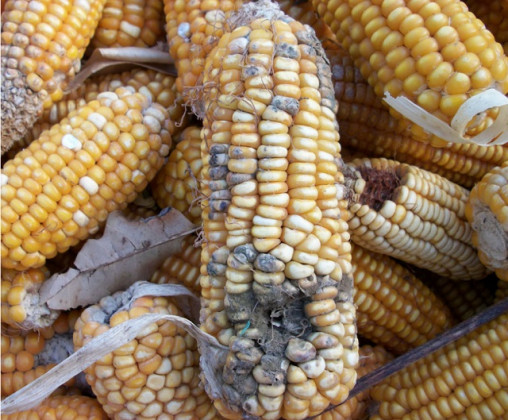KAMPALA, UGANDA: The Uganda National Bureau of Standards, UNBS, has allied with the Ministry of Agriculture, Animal Industry and Fisheries-MAAIF, along with civil society organizations to fight aflatoxins in the country’s produce, especially grain foods.
Aflatoxins are poisonous compounds produced by molds/fungi when they invade not-well-dried foods such as maize, groundnuts, sorghum, soybean, millet, cassava, sweet potatoes, spices, and fish as well as animal feeds if processed from contaminated foods, and can cause death to humans and animals. They have also been linked to liver cancer.
Patricia Bageine Ejalu, the UNBS deputy executive director says that though the country is facing numerous food quality challenges, the standards body cannot handle all of them at a go.
According to Bageine, the campaign will focus on sensitizing various stakeholders in these foods value chain on how to handle them right from the farm, adding that this will have an impact on the final product which a Ugandan consumes.
Bageine anticipates that when the practices to fight aflatoxins are streamlined, this will in turn solve other related challenges.
“When you become clean, you may get rid of the yeast molds, and the others that might be causing problems in the crops,” she explained.
In this campaign, partnering agencies and organizations will be reaching out to key players in the sector value chain, including farmers, traders, processors, and transporters as well as the consumers to put out the information on the practices that should be followed in ensuring the safety of these foods, hence improving quality.
The campaign will be handled in two phases, starting this month and will take six months, with the MAAIF extension services structure as the tool used to reach out to the farmers, with funds from Oxfam.
The partnership comes at a time when research indicates that Uganda loses 577 million dollars annually as a result of aflatoxin related problems in health and export business.
Uganda’s grains, especially maize, have been suspended from some markets like Kenya. Bageine says that such campaigns are called for because many people do not have the required information.
Francis Odokorach, the Oxfam country director for Uganda says that aflatoxins not only cause diseases but are also responsible for the loss of up to 25% of the food produced in the country.
Odokorach continues that they are out to help mitigate such a loss to farmers especially the women who are their focal community in the efforts of uplifting the farmers household income.
He also adds that they will ensure that everyone in the value chain plays their role effectively.
The other agencies and CSOs in the campaign are the Grain Council of Uganda, National Farmers Federation, Food Rights Alliance, the International Institute for Tropical Agriculture, Eastern and Southern Small Scale Farmers Forum, and the Participatory Ecological Land Use Management-Uganda.
If you would like your article/opinion to be published on Uganda’s most authoritative news platform, send your submission on: [email protected]. You can also follow DailyExpress on WhatsApp and on Twitter (X) for realtime updates.



